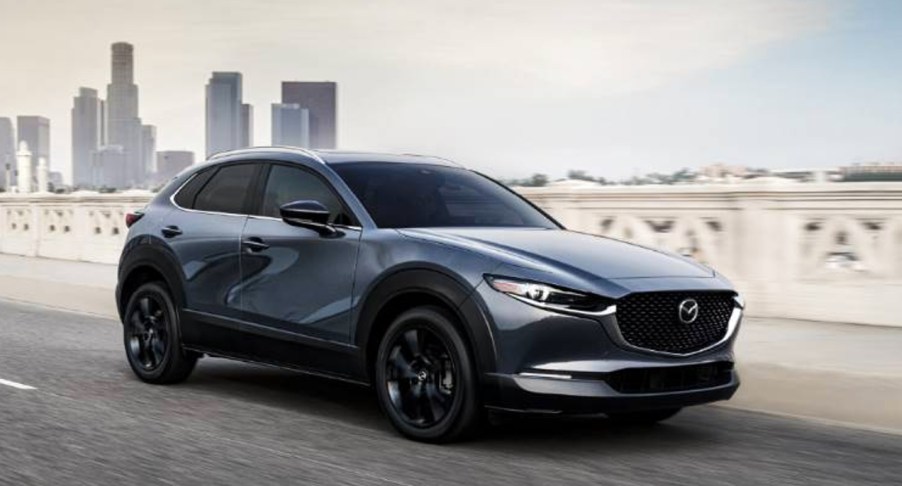
Driven: 7 Ways the Mazda CX-30 Trumps the Honda HR-V
We’ve spent time with the Mazda CX-30 and the Honda HR-V to get some personal research on the tiny SUV battle. While the 2023 Honda HR-V is new with tons of perks, it seems to fall short against the 2023 Mazda CX-30.
2023 Mazda CX-30 vs. 2023 Honda HR-V

The first thing to consider is the price. The 2023 Honda HR-V starts at $23,800 and has three trim levels. The top-spec Honda HR-V EX-L trim brings the price up to about $27,900.
You can get started with the 2023 Mazda CX-30 for about $22,950, and it has four different trim levels. The top-of-the-line 2.5 S Carbon Edition brings the cost to $29,290.
So it’s cheaper to get started with the CX-30, and it has more options. But the HR-V could gain more features in time. Plus, the CX-30 could include more value as it comes loaded with valuable standard features such as all-wheel drive. You can add AWD to the HR-V.
Does the HR-V or the CX-30 have a better performance?
The 2023 Honda HR-V comes with a 2.0-liter four-cylinder engine with 158 hp and 138 lb-ft of torque. It can accelerate from 0 to 60 mph in about 10 seconds. It’s adequate, but not exactly thrilling.
With the 2023 Mazda CX-30, the standard 2.5-liter four-cylinder engine cranks out 186 hp and 186 lb-ft of torque. It can reach 60 mph in about 8.0 seconds, which is suitable for the class.
Upgrade to the turbocharged 2.5-liter four-cylinder engine for up to 250 hp and 320 lb-ft of torque. With this engine, the CX-30 reaches 60 mph in about 6.4 seconds.
The HR-V has a surprisingly smooth ride, but the breaks are a little soft. It feels confident around curves with little body roll, but it’s loud. It’s noisy at highway speeds, and the engine emits a loud wheeze while going uphill or under harsh acceleration.
The Mazda CX-30 has a Sport Mode, and available steering-wheel-mounted paddled shifters for more engagement. The suspension is a bit stiffer for an athletic performance. You can feel slight impacts from the road, but the tires seem connected for enhanced control.
Also, the CX-30 is much quieter at highway speeds with a more attractive engine roar. It offers more seat padding, making it more comfortable during longer rides than the HR-V. Plus, it has rear vents for the passengers, while the HR-V doesn’t.
Both can be well-equipped to fight inclement weather situations. However, during light off-roading tests, the HR-V struggled on gravel inclines a lot more than the CX-30.
Does the Mazda CX-30 or Honda HR-V have better features?

The 2023 Mazda CX-30 has an 8.8-inch infotainment system that’s controlled by a rotary dial. The 2023 Honda HR-V starts with a 7.0-inch touchscreen that can be upgraded to a 9.0-inch unit.
The HR-V has an edge because it offers wireless Apple CarPlay and Android Auto, while the CX-30 requires a cord. Both SUVs have optional features such as a wireless phone charging pad, premium audio, and built-in navigation.
However, the CX-30 offers a head-up display, 360-degree surround-view camera, lumber adjustment, Traffic Jam Assist, and a power liftgate.
You can access up to 20.2 cubic feet of cargo space in the rear of the CX-30 and up to 45.2 cubes total. The HR-V provides 24.4 cubes behind the backseat, with up to 55.1 cubes in total.
While the HR-V is slightly better on fuel and cargo space, the CX-30 has a lower price, more options, two engines, more standard features, more available tech, an enhanced athletic performance, and a more comfortable ride.
Honda HR-V advantages
- Fuel economy
- Cargo space
- Wireless Apple CarPlay and Android Auto
Mazda CX-30 advantages
- Comfort
- Lower price
- More value like standard AWD
- More tech options
- A sportier performance
- Two engines
- A more refined interior



